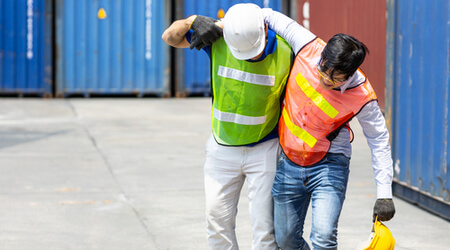
Workers who are employed in the maritime industry but never leave the harbor are protected from the financial consequences of work-related injury under admiralty laws, much as seagoing workers are.
The Longshore and Harbor Workers’ Compensation Act provides compensation and medical care to employees disabled from injuries that occur on the navigable waters of the United States or in adjoining areas used in loading, unloading, repairing or building a vessel. Survivor benefits also are provided if the work-related accident causes the employee’s death.
This system is an insurance program, much like workers’ compensation. Payment should be made to the injured employee regardless of fault. Unfortunately, like workers’ comp claims, Longshore and Harbor Workers’ Compensation Act claims made by deserving workers are often challenged.
Joye Law Firm can assist harbor workers seeking compensation for maritime injuries. If you have a claim, we want to help you. Call Joye Law Firm now for a free claim evaluation. You can reach us by phone or by using this online contact form.
Common Injury Hazards in Longshore & Harbor Work
The Longshore and Harbor Workers’ Compensation Act covers any harbor worker or longshoreman (a person employed in a port to load and unload ships, sometimes called a “stevedore”) or other persons engaged in longshoring operations, including:
- Shipbuilding, repair and work in boatyards
- Ship dismantling (ship-breaking)
- Marine cargo-handling facilities.
Compensation through the act may be available for expenses related to any injury, illness, infection or death arising out of job-related activities, and any injury caused by the willful act of a third person (assault, for example) directed against an employee because of his or her employment.
Cranes and derricks involved in maritime operations pose a great risk to harbor workers and longshoremen. Falling, moving or swinging cargo, equipment, tools, materials, etc., can cause grave injury if a person is struck. Cranes and derricks can also collapse.
Crane accidents can be fatal or leave workers with severe injuries and lifelong physical disabilities. The risk of injury increases in operations above the water.
Crane accidents may be caused by faulty or unmaintained wires or winches, negligence by longshoremen involved in rigging or loading / unloading operations, and lack of proper supervision or training among harbor workers.
Longshore and harbor workers are also susceptible to other common workplace injuries, such as:
- Overexertion (from lifting, holding, carrying, pushing, pulling or throwing)
- Falls to the same level
- Falls to a lower level
- Adverse bodily reactions (caused by bending, reaching, climbing, standing, sitting, slipping or tripping without falling)
- Motor vehicle accidents, including being hit by moving vehicles such as top-loaders, front-end loaders, forklifts, roll-on / roll-off (RORO or ro-ro) vehicles, trucks, or more
- Caught in or compressed by objects or machinery
- Struck against objects (including being pushed into structures)
- Repetitive-motion injuries (repeated stress or strain)
- Violence
Contact Our South Carolina Injury Lawyers About Your Maritime Claim
If you have been injured in an occupational accident at a South Carolina harbor, port or other onshore maritime industry workplace, you may be eligible for compensation under the federal Longshore and Harbor Workers’ Compensation Act. Because of the complexity of the law, your claim could easily be disputed or you may make mistakes that damage your eligibility for benefits.
We suggest you talk to an experienced maritime accident attorney from Joye Law Firm as soon as possible. We can investigate your accident and injuries to determine the compensation you are due, and we can help you file a claim or appeal a denial of benefits.
Call Joye Law Firm now to protect your rights. We want to help you obtain the compensation you deserve and need. Call us or use our online contact form today to set up a free initial legal consultation.
Source:
- Liberty Mutual Workplace Safety Index
- U.S. Department of Labor – Longshore and Harbor Workers’ Compensation Act
- OSHA – Summary No. 16 – Longshore Worker Killed by a Top Loader



























